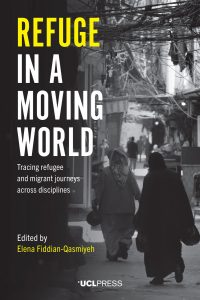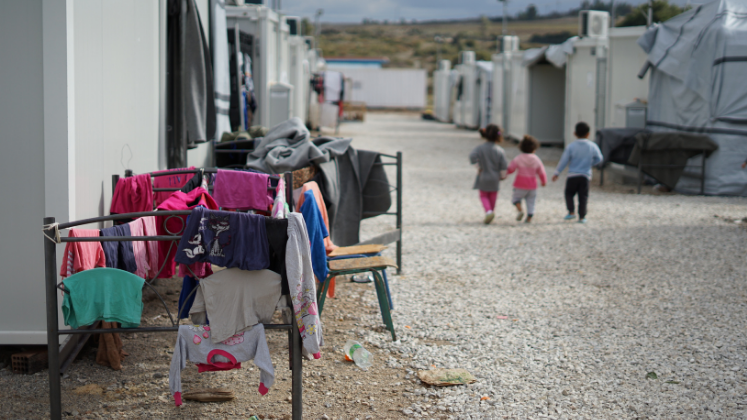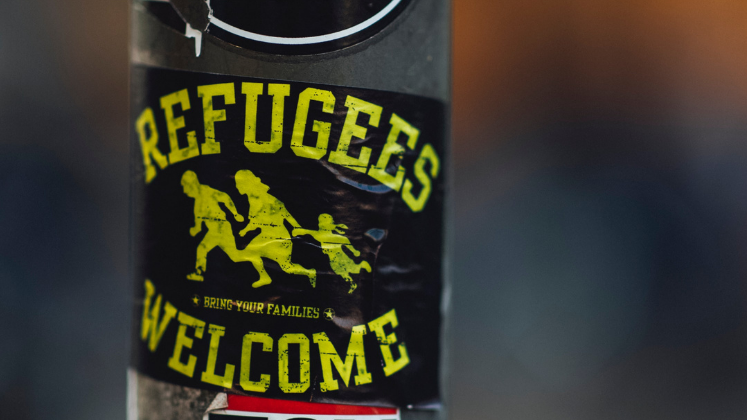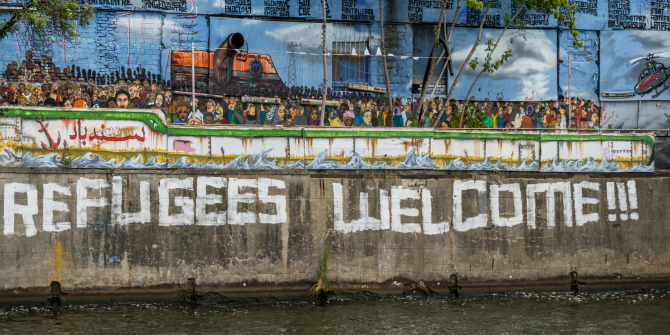In Refuge in a Moving World: Tracing Refugee and Migrant Journeys Across Disciplines – available open access– editor Elena F. Qasmiyeh brings together contributors to offer an interdisciplinary exploration of the complexities of refugee and migrant journeys and experiences. This book will be an important resource for those researching displacement as well as readers seeking to better understand and stay in solidarity with those who have had to seek refuge and make a home on different soil, writes Öykü Hazal Tural.
Refuge in a Moving World: Tracing Refugee and Migrant Journeys Across Disciplines. Elena F. Qasmiyeh (ed.). UCL Press. 2020.
 Edited by Elena F. Qasmiyeh, Refuge in a Moving World: Tracing Refugee and Migrant Journeys Across Disciplines brings together 32 important contributions that collectively convey the message that displacement is a complex process and often an ongoing experience that requires deeper reflections on the relational and intersectional aspects of identities and cultures over time and across spaces of refuge.
Edited by Elena F. Qasmiyeh, Refuge in a Moving World: Tracing Refugee and Migrant Journeys Across Disciplines brings together 32 important contributions that collectively convey the message that displacement is a complex process and often an ongoing experience that requires deeper reflections on the relational and intersectional aspects of identities and cultures over time and across spaces of refuge.
Given the rapid changes global society faces and the increasing numbers of immigrants, refugees, asylum seekers, homeless or internally displaced people, this book raises some pressing questions: how to address social, political and spatial systems that reproduce discrimination, exclusion and violence? And how to promote understandings of mutuality between those who are displaced and communities that are hosting them?
The volume is divided into four sections approaching these questions from several different but interconnected angles. The first part is dedicated to different approaches to writing in, through and from displacement. Here, contributors discuss the potential and complexities of employing participatory, collaborative and creative methodologies in researching and responding to displacement. They also acknowledge that some refugees may choose to remain invisible as a response to the hypervisibility of certain stereotypes of refugeehood that limit refugees’ choices in how to present themselves.

Photo by Julie Ricard on Unsplash
In the second part, contributors discuss responses to displacement including arts-based, humanitarian and activist approaches by highlighting their complexities relating to identity, solidarity and agency. In particular, Sarah Crafter and Rachel Rosen’s chapter offers nuanced understanding of humanitarian care by drawing on a volunteering case in a Calais refugee camp, asking how care is received especially by those who are not used to receiving it. This is an important insight prompting the reader to imagine care through negotiations, tensions and the processes of adaptation it encompasses. Perhaps these insights could have been furthered by paying consideration to the implications of racialised hierarchies of power and privilege embedded especially in humanitarian practices for formulating an ethics of care.
The third part foregrounds psychosocial approaches to displacement and discusses how different communities, such as Yezidis, South Ossetians, children and LGBTQ people, make sense of and respond to the harm they have suffered individually and collectively. In the last part, contributors draw on spatial and temporal understandings of spaces of refuge and encourage the reader to question how one understands the self and the other relationally in such spaces.
The book presents perspectives that challenge the reader to think displacement alongside themes such as the agency of the displaced, the politicisation of humanity and the humanisation of politics. It engages in some important philosophical debates, such as the ontologies of self and other, moral responsibility and the paradoxical hierarchies between guests and their hosts. But it does so by guiding the reader through contributions that use historical, spatial, relational and intersectional lenses to address the difficulties and complexities of human movement, thereby aiding a fuller understanding of these debates. Qasmiyeh’s poems, dispersed across the collection, also add to this understanding by bringing the reader closer to the realities of displacement with their vivid narration, demonstrating the value of going beyond conventional academic forms of writing when dealing with an intricate subject like refuge.
As I kept shifting between the different contributions in the book, I realised that the distance-proximity paradox in relations of hospitality and welcome had guided my reading. Certainly, this experience stems from my own research interests, and perhaps other readers can find different grounds to explore the book.
Several contributions demonstrate that hospitality – seen from the perspective of who owns things to offer to the other or who doesn’t own the means by which to lavish on the one that shows up – can be radically compelling. In today’s political system hospitality becomes an arsenal that the host commands. It offers shelter, but it’s also a threshold between those who belong and therefore can extend welcome to the other, and those who don’t and therefore have to ask for protection and recognition. Distance and proximity are not physical in this relationship, but rather moral, setting boundaries between those in need and their spectators whose moral sentiments can be evoked through images of suffering and humanitarian narratives of rescue.
This line of thinking presented in the book urges us to reconsider implicit privileges embedded into the ethical responsibility of welcoming, and reminds us that the cultural story of hospitality we blindly inherit, and are still bound by, can be imbued with some repressive elements, raising questions such as: to whom will the generosity of welcome be extended? And under what conditions? Surely, as Sara Ahmed (2007) has shown in the case of Britain, such narratives of welcoming are often met by counter-narratives mediated by emotions like hate against those incoming others perceived as `bogus’ and abusing the nation. Such counter-narratives can, then, reframe demands and practices of hospitality as contributing to that abuse.
Perhaps a bigger tension the volume made me think about is when hospitality is institutionalised through laws and regulatory frameworks of the modern-day nation state, and ethical responsibility towards others entangles with politics within which responsibility is being practised. Michela Franceschelli and Adele Galipo’s contribution in the volume addresses this tension by drawing on local dynamics of hospitality and hostility on the island of Lampedusa, Italy. They argue that in cases where responsibility towards others is mediated by the state – in other words, when politics becomes the mediator of ethical responsibility – it relieves us from making decisions and judgements on matters relating to non-citizens, but it also carries the potential of creating distance and politicising humanity.
What this volume calls for instead is a degree of proximity that comes with opening towards the other (also discussed in the writings of philosophers Jacques Derrida (2001) and Emmanuel Levinas (1998)) and enabling spaces of radical openness, as bell hooks (1989) put it, where each side’s differences are recognised, respected and appreciated without denying forces of oppression and control. These ideas may sound utopian in a world of rising anti-refugee feelings and xenophobia. But the connectedness that comes through candid conversations with each other as members of different groups living in the same society can be a bridge towards developing values of mutuality, inclusion and responsibility.
The volume’s biggest contribution is opening up a critical space for multiple disciplines and practices including arts, advocacy, activism, the social sciences and the humanities to develop nuanced understanding of the meanings of and forces involved in human movement. Therefore, it is an important resource for those researching displacement, but it is also a good read for those seeking to better understand, prepare for or stay in solidarity with those who have had to seek refuge and make a home on different soil.
Note: This review gives the views of the author, and not the position of the LSE Review of Books blog, or of the London School of Economics and Political Science.







